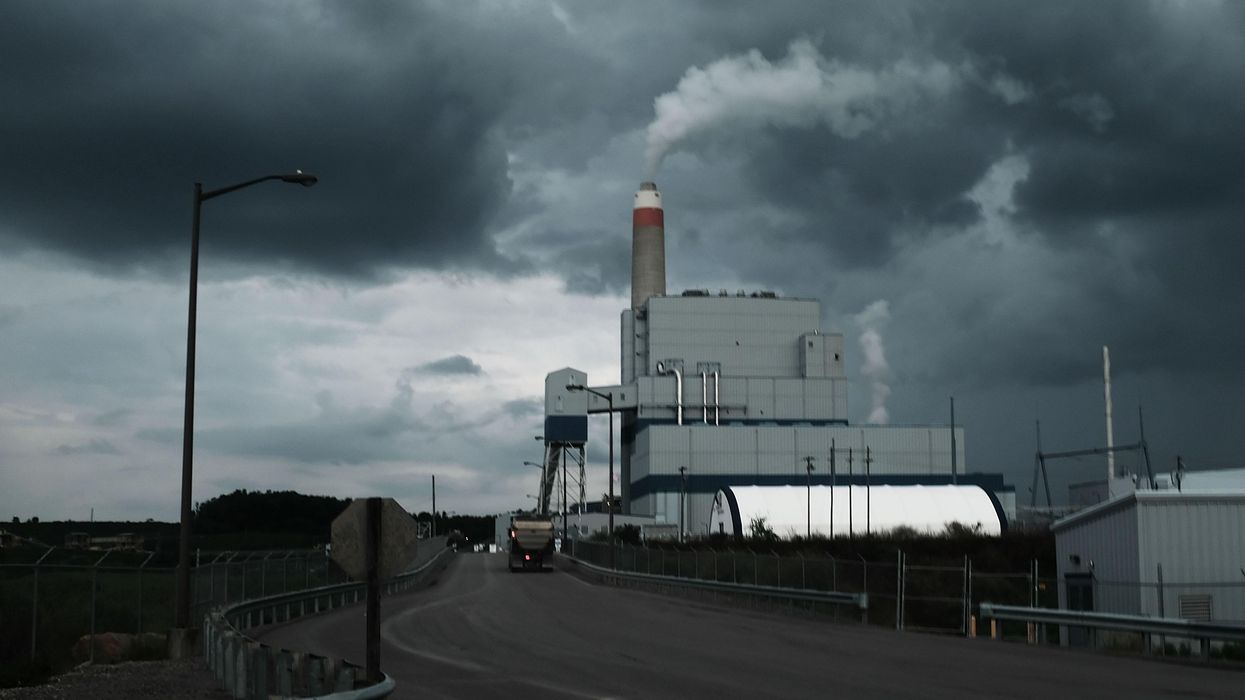August, 28 2013, 01:00pm EDT
For Immediate Release
Contact:
The Environmental Integrity Project: Patrick Mitchell, for Environmental Integrity Project, at (703) 276-3266 or pmitchell@hastingsgroup.com or Tarah Heinzen, attorney, EIP at (202) 263-4441 or theinzen@environmentalintegrity.org.
Food & Water Watch: Rich Bindell, 202-683-2457; rbindell@fwwatch.org
The HSUS: Samantha Miller, 301-258-1417; smiller@humanesociety.org
Iowa Citizens for Community Improvement: David Goodner, 515.282.0484; david@iowacci.org
Center for Food Safety: Abigail Seiler, 443-854-4368; Abigail@CenterforFoodSafety.org
Coalition Sues Environmental Protection Agency for Abandoning Critical Factory Farm Rule
EPA unlawfully scrapped proposal to collect basic information about Factory Farms necessary to protect nation’s waterways
WASHINGTON
A coalition of community, animal welfare and environmental organizations is filing a lawsuit against the United States Environmental Protection Agency challenging the Agency's withdrawal of a proposed rule that would have allowed EPA to collect basic information, like locations and animal population sizes, from factory farms.
The Center for Food Safety, Environmental Integrity Project, Food & Water Watch, The Humane Society of the United States, and Iowa Citizens for Community Improvement filed the suitin the U.S District Court for the District of Columbia, arguing that the Agency's withdrawal of the proposed rule lacks the rational basis required by law. The information at issue is critical to the EPA's ability to protect waterways from pollutants produced by factory farms, one of the country's largest sources of water pollution.
Hugh Espey, executive director at Iowa Citizens for Community Improvement said: "While power plants, waste treatment facilities and manufacturers have had to comply with the protective standards of the Clean Water Act, the factory farming industry has managed to evade any meaningful regulation. After over three decades, there is no rational reason for why EPA won't enact the types of Clean Water Act approaches with factory farms that have worked well with all of our other polluting industries."
Jonathan Lovvorn, senior vice president and chief counsel for animal protection litigation at The HSUS said: "The animal agriculture industry has benefited from EPA's lack of information for decades, and has successfully opposed efforts to increase transparency. This certainly is not good for animals, humans or the environment; it is only good for massive industrialized farms."
George Kimbrell, senior attorney for the Center for Food Safety, stated: "With the withdrawal, EPA continues to pursue a CAFO pollution control policy that can only be described as willful ignorance. As long as EPA continues to turn an unlawfully blind eye towards this industry, our waterways and communities will never be safe."
Tarah Heinzen, an attorney with Environmental Integrity Project stated: "Our ask is modest; we are urging EPA to fulfill its mission and start to get a better understanding about one of the largest sources of pollution threatening our nation's rivers, streams and bays. It's a sad commentary on the agency when we have to go to court to get that accomplished."
Factory farms are industrial facilities that confine thousands of animals in limited land areas for meat, dairy and egg production. The operations that would have been subject to this rule are the factory farms falling within the "CAFO" point source category under the Clean Water Act, a category that consists of the Nation's largest and dirtiest operations.
EPA estimates there are 20,000 CAFOs in the United States producing three times as much waste as humans. Although this waste contains pathogens, heavy metals, antibiotics and hormones, EPA does not require all factory farms to meet waste management and treatment requirements.
The Columbia University School of Law Environmental Law Clinic is providing legal representation in the case.
Background
In 1972, the clear water pollution threat posed by CAFOs' staggering waste stream led Congress to mandate that EPA must regulate CAFOs pursuant to the Clean Water Act. Despite this 40-year-old mandate, EPA continues to lack basic data about factory farms, including accurate and consistent information on their size, location and waste management practices.
Under the abandoned rule, known as CWA Section 308 Rule, the agency was to begin gathering this basic information. The proposed CWA Section 308 Rule made a strong case for the need for information collection based on inadequate existing data. Following strong industry opposition, EPA withdrew the rule. In its rule withdrawal, EPA radically shifted its position without justification.
The agency now claims that instead of using its authority under the Clean Water Act to gather information directly from CAFO owners and operators, it will seek to gather existing information about CAFOs from various state and federal agencies. This approach contradicts recent government reports, which confirm that state agency CAFO data is "inconsistent and inaccurate and does not provide EPA with the reliable data it needs..." and that "no federal agency collects accurate and consistent data on the number, size, and location of CAFOs." This legal action asserts the EPA's change in position is arbitrary because alternative courses of action cannot provide the crucial information.
In the fall of 2012, several environmental organizations filed Freedom of Information Act requests with EPA for all of the state-generated data gathered by the Agency. After industry browbeating, the Agency attempted to recall some of the records that it originally produced. Nevertheless, Food & Water Watch retained and reviewed all of the original records.
Wenonah Hauter, executive director at Food & Water Watch stated: "Our review of these records confirms what EPA has already admitted in its preamble to the 308 Rule. The data from the states is inconsistent, incomplete and, ultimately, will not allow the agency to finally begin the process of properly regulating these highly polluting facilities."
LATEST NEWS
Green Group Slams EPA Failure to Curb 'Dangerous Levels of Air Pollution'
"Air pollution standards must protect endangered plants and wildlife, but the agency failed to follow the law, or the science, to fully address this toxic air pollution's harms to the environment," said one attorney.
Apr 15, 2024
The Center for Biological Diversity on Monday lamented what it called the Biden administration's failure to improve "outdated" limits on nitrogen and soot air pollution.
The U.S. Environmental Protection Agency (EPA) proposed keeping existing secondary national ambient air quality standards for sulfur and nitrogen oxides after estimating that new benchmarks previously put forth would result in reduced pollution from sources including coal-fired power plants.
However, Center for Biological Diversity (CBD) staff attorney Ryan Maher argued that "the EPA failed to seize this important opportunity to better protect plants and animals from these toxic pollutants."
"Since the EPA's last review of these pollution standards, the science showing the ecological harm from soot, sulfur, and nitrogen air pollution has become more certain."
"Since the EPA's last review of these pollution standards, the science showing the ecological harm from soot, sulfur, and nitrogen air pollution has become more certain," Maher added. "Rather than aligning its standards with this new research, the EPA has chosen to perpetuate dangerous levels of air pollution."
The Clean Air Act requires the EPA to set primary, or health-based, and secondary, or welfare-based, "national ambient air quality standards" for pollutants including sulfur oxides, nitrogen oxides, and particulate matter—better known as soot. However, the EPA has failed to update the secondary standards for nitrogen and sulfur air pollution for more than half a century. Key portions of the EPA's secondary soot standards also haven't been updated in decades.
According to the CBD:
The agency published today's proposal under an agreement that resulted from a 2022 lawsuit brought by the Center for Biological Diversity and the Center for Environmental Health. That agreement requires the agency to finalize its decision on the air quality standards no later than December 10, 2024.
The agency will hold a virtual public hearing on the proposed rule on May 8.
Critics have also called out the EPA for not completing a mandatory Endangered Species Act consultation with the U.S. Fish and Wildlife Service and National Marine Fisheries Services about how pollution levels allowed under the proposed standards could harm endangered plants and animals.
"Air pollution standards must protect endangered plants and wildlife, but the agency failed to follow the law, or the science, to fully address this toxic air pollution's harms to the environment," Maher noted.
Separately, green groups including Earthjustice, Sierra Club, California Communities Against Toxins, and Southwestern Environmental Law Center on Monday welcomed the EPA's decision to deny an industry petition to delist energy turbines as a major source of air pollution.
"Today's decision upholds critical environmental protections that are essential for safeguarding public health, particularly in communities that have historically borne the brunt of industrial pollution," Earthjustice director of federal clean air practice James Pew said in a statement.
"Keeping pollution control requirements in place is not just a matter of regulatory compliance; it's a fundamental environmental justice issue," Pew added. "EPA did the right thing by rejecting industry's attempt to dodge these requirements and get a free pass to pollute."
Keep ReadingShow Less
Sunrise Protesters Arrested at VP's House Demanding Biden Declare a Climate Emergency
"We deserve an administration who will fight for us, but instead of declaring a climate emergency, we are seeing Biden and Harris expand oil and gas production to record levels."
Apr 15, 2024
Six young activists were arrested outside Vice President Kamala Harris' Los Angeles home on Monday while calling on the White House to declare a climate emergency, according to the youth-led Sunrise Movement.
Harris and President Joe Biden–Democrats who are seeking reelection in November—campaigned as climate champions in the 2020 cycle but have had a mixed record on the topic since entering office.
"My generation is spending our teenage years organizing for climate action because people like Kamala Harris have failed us," said Adah Crandall, one of the activists arrested after blockading the street outside her California residence overnight.
"We're ready to do whatever it takes to win a climate emergency declaration—we will camp out overnight, we will get arrested, we will mobilize our peers by the thousands to win the world we deserve," the 18-year-old continued. "The Biden administration are cowards for not standing with young people."
"The Biden administration are cowards for not standing with young people."
The White House has been praised for climate provisions in the Inflation Reduction Act as well was a recent pause on liquefied natural gas exports. However, the president has also faced criticism for continuing fossil fuel lease sales, backing the Mountain Valley Pipeline and Willow oil project, and skipping last year's United Nations summit.
Just last week, the Biden administration approved a license for a pipeline company to build the nation's largest offshore oil terminal off of Texas' Gulf Coast—despite surging fossil fuel pollution that is pushing up global temperatures.
Sunrise last week condemned the approval as "very disappointing" and also joined with Campus Climate Network and Fridays for Future USA to announce Earth Day demonstrations intended to pressure Biden to declare a climate emergency.
Biden
claimed last year that "practically speaking," he had already declared a national climate emergency; however, as campaigners and experts have stressed, actually doing so would unlock various federal powers to tackle the fossil fuel-driving crisis.
"Our communities in California breathe toxic air from fossil fuels and face fires that destroy our homes," noted 18-year-old Ariela Lara, who was arrested at Harris' home.
"I'm on the frontlines raising my voice for my Black and Latine families and friends," Lara added, "because I know that we deserve to have affordable housing and healthcare, we deserve an administration who will fight for us, but instead of declaring a climate emergency, we are seeing Biden and Harris expand oil and gas production to record levels."
The action targeting Harris came after a February protest at Biden's campaign headquarters in Delaware that also led to arrests.
Keep ReadingShow Less
Democracy Defenders Stress NY Trump Trial 'Is About Voter Deception'
"Trump engaged in criminal acts to cover up the truth just days before the 2016 election, and now he will finally face a jury of everyday Americans."
Apr 15, 2024
As former U.S. President Donald Trump's first of four potential criminal trials began in New York on Monday, progressive groups emphasized that what is often called a hush money case involving a porn star "is about voter deception."
Trump, the presumptive Republican candidate to face Democratic President Joe Biden in November, faces 91 felony charges across the four cases. For this one, he was indicted by a New York grand jury last spring with 34 counts of falsifying business records related to alleged hush money payments to cover up sex scandals during the 2016 election cycle.
The payments were made by Michael Cohen, Trump's former fixer, to porn star Stormy Daniels, and by the tabloid The National Enquirer to Karen McDougal, a former Playboy model. The twice-impeached ex-president has pleaded not guilty.
"This case is about the allegation that Trump criminally hid information from voters to influence the outcome of the 2016 election," said Lisa Gilbert, executive vice president of the watchdog group Public Citizen, in a statement Monday.
"You can draw a clear pattern from this election interference behavior to his more emboldened efforts to subvert the 2020 election, which led to the January 6th insurrection, a lasting stain on American democracy," she added, referring to the 2021 U.S. Capitol attack that some critics argue makes him constitutionally ineligible to hold office again. "Accountability for criminal deception of voters is absolutely necessary to ensure future candidates and public officials know they can't get away with this sort of conduct."
Gilbert stressed that "despite what Donald Trump and his allies may claim, no one is above the law—including a former president charged with serious crimes, and today marks the start of the legal system's chance to prove this point."
Stand Up America president and founder Sean Eldridge similarly celebrated that "Donald Trump will finally face accountability for falsifying his company's business records in order to conceal damning information from voters ahead of the 2016 election."
"Concealing secret payments and then lying in official filings to cover it up is a serious crime, which is why Trump has been charged with 34 felony counts," Eldridge said. "This case is a clear example of Trump's pattern of engaging in criminal behavior to cling to power and hide the truth from the American people. No one is above the law in the United States of America, including former presidents."
"A functioning democracy depends on voters having the information they need to pick their leaders," he continued. "Trump engaged in criminal acts to cover up the truth just days before the 2016 election, and now he will finally face a jury of everyday Americans."
This is the first criminal trial of a former American president. Monday featured a series of rulings from Judge Juan Merchan—who has rejected Trump's demands that he step away from the case—and the beginning of jury selection.
The New York Timesreported that "the initial pool of prospective jurors dwindled rapidly. More than half of the first group of 96 were dismissed in short order after indicating that they did not believe they could be impartial. Court adjourned for the day roughly two hours after jury selection began, with zero jurors chosen."
In addition to the case in New York, Trump faces two federal cases—overseen by Special Counsel Jack Smith because of Trump's 2024 campaign. One is about his mishandling of classified material and the other stems from his attempt to reverse the 2020 election results. The Republican also faces a Georgia case for interfering with the last presidential contest.
It is not clear whether any of the other three cases will go to trial before the November election. Trump is trying to claim presidential immunity to get the federal election charges dismissed and the U.S. Supreme Court—to which he appointed three justices—is set to hear arguments in that case on April 25.
Public Citizen is among the groups that last week submitted briefs to the high court criticizing Trump's claims. The watchdog's president, Robert Weissman, said that "Trump's legal theory defies common sense and would enable an almost limitless tyranny. Nothing in the Constitution—which aims to prevent tyranny—supports Trump's theory."
Keep ReadingShow Less
Most Popular


